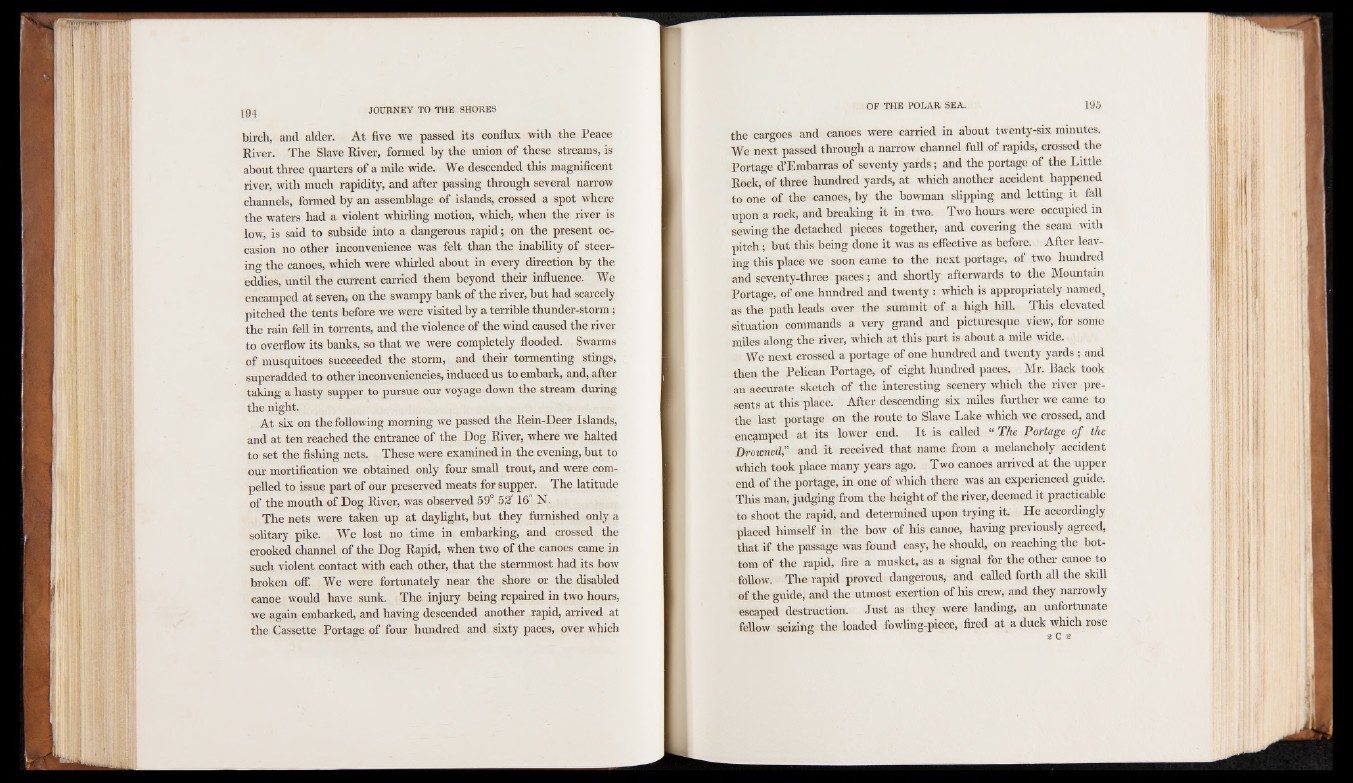
birch, and alder. At five we passed its conflux with the Peace
River. The Slave River, formed by the union of these streams, is
about three quarters of a mile wide. We descended this magnificent
river, with much rapidity, and after passing through several narrow
channels, formed by an assemblage of islands, crossed a spot where
the waters had a violent whirling motion, which, when the river is
low, is said to subside into a dangerous rapid; on the present occasion
no other inconvenience was felt than the inability of steering
the canoes, which were whirled about in every direction by the
eddies, until the current carried them beyond their influence. We
encamped at seven, on the swampy bank of the river, but had scarcely
pitched the tents before we were visited by a terrible thunder-storm;
the rain fell in torrents, and the violence of the wind caused the river
to overflow its banks, so that we were completely flooded. Swarms
of musquitoes succeeded the storm, and their tormenting stings,
superadded to other inconveniencies, induced us to embark, and, after
taking a hasty supper to pursue our voyage down the stream during
the night.
At six on the following morning we passed the Rein-Deer Islands,
and at ten reached the entrance of the Dog River, where we halted
to set the fishing nets. These were examined in the evening, but to
our mortification we obtained only four small trout, and were compelled
to issue part of our preserved meats for supper. The latitude
of the mouth of Dog River, was observed 59° 52' 16" N.
The nets were taken up at daylight, but they furnished only a
solitary pike. We lost no time in embarking, and crossed the
crooked channel of the Dog Rapid, when two of the canoes came in
such violent contact with each other, that the sternmost had its bow
broken off. We were fortunately near the shore or the disabled
canoe would have sunk. The injury being repaired in two hours,
we again embarked, and having descended another rapid, arrived at
the Cassette Portage of four hundred and sixty paces, over which
the cargoes and canoes were carried in about twenty-six minutes.
We next passed through a narrow channel full of rapids, crossed the
Portage d’Embarras of seventy yards; and the portage of the Little
Rock, of three hundred yards, at which another accident happened
to one of the canoes, by the bowman slipping and letting it fall
upon a rock, and breaking it in two. Two hours were occupied in
sewing the detached pieces together, and covering the seam with
pitch; but this being done it was as effective as before. After leaving
this place we soon came to the next portage, of two hundred
and seventy-three paces; and shortly afterwards to the Mountain
Portage, of one hundred and twenty : which is appropriately named;
as the path leads over the summit of a high hill. This elevated
situation commands a very grand and picturesque view, for some
miles along the river, which at this part is about a mile wide.
We next crossed a portage of one hundred and twenty yards ; and
then the Pelican Portage, of eight hundred paces. Mr. Back took
an accurate sketch of the interesting scenery which the river presents
at this place. After descending six miles further we came to
the last portage on the route to Slave Lake which we crossed, and
encamped at its lower end. It is called ?.The Portage of the
Drowned,” and it received that name from a melancholy accident
which took place many years ago. Two canoes arrived at the upper
end of the portage, in one of which there was an experienced guide.
This man, judging from the height of the river, deemed it practicable
to shoot the rapid, and determined upon trying it. He accordingly
placed himself in the bow of his canoe, having previously agreed,
that if the passage was found easy, he should, on reaching the bottom
of the rapid, fire a musket, as a signal for the other canoe to
follow. The rapid proved dangerous, and called forth all the skill
of the guide, and the utmost exertion of his crew, and they narrowly
escaped destruction. Just as they were landing, an unfortunate
fellow seizing the loaded fowling-piece, fired at a duck which rose